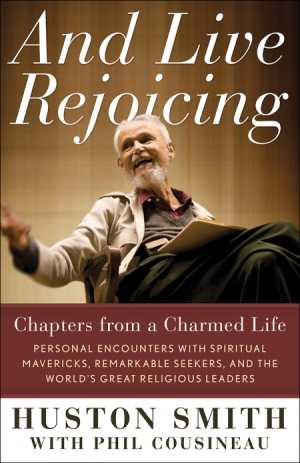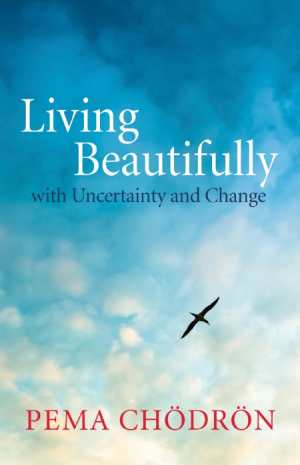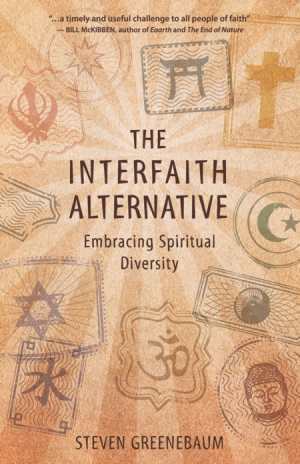Higher Ground is Common Ground

“Our ‘real evolution’ will be in the ability of consciousness to break out of individual pockets … and phase into God’s infinite consciousness,” writes philosopher, educator, writer, and world citizen Huston Smith in And Live Rejoicing: Chapters from a Charmed Life (New World Library, 978-1-60868-071-9). This colorful and passionate memoir offers the tantalizing picture of a man who is open to tasting all the world’s varied flavors.
Born in 1919 to missionary parents stationed in China, Smith was drawn to history and religion (which for him was defined as “what we do with our spiritual life and our faith”) from early childhood. Eagerly opening his mind and heart to all traditions, he became a practitioner of many, and experienced the wisdom and love that lie at the heart of them all.
While religion has historically tended to foster exclusivity, Smith offers the spiritual techniques he has used—yoga, meditation, and prayer—as tools for breaking through the walls of what they assume to be “right belief.” “I find it interesting to speculate what the world would be like if empathy were the warp and woof of human relationships,” he writes, nearing the end of his life. “It seems possible to me that we would then be close—or at least closer—to The Kingdom of God on Earth.”
Smith, whose long life has held its share of tragedy, has found his way to what he calls the “peculiar kind of joy” that lies at the center of religious life, a joy that involves connecting with all kinds of people, from the Dalai Lama, who wanted most of all to converse with him about science, to a retired English farmer, who claimed not to have slept for forty-eight years. In spite of our differences, or perhaps because of them, we need each other, he affirms, saying, “We are like theatre tickets that read, ‘Not good if detached.’”

A New Way to be Human: 7 Spiritual Pathways to Becoming Fully Alive (New Page Books, 978-1-60163-215-9) begins with the story of author Robert V. Taylor’s healing, through prayer, of a debilitating spine condition. His experience of freedom from confinement opened him to his life’s work: helping people identify and break free of what holds them back from living fully. In his native South Africa, Taylor witnessed both oppression and what could happen when people were given freedom to express their gifts. His outspoken stand against apartheid left him facing the possibility of imprisonment until his friend and mentor, Archbishop and Nobel Laureate Desmond Tutu, facilitated his leaving the country. Taylor then served in the Diocese of New York, helping to build a community social service center that offered HIV/AIDS programs to veterans and people of color, in-home aid for the elderly, and other much-needed services. In 1999, he was elected dean of St. Mark’s Episcopal Cathedral in Seattle, becoming the first openly gay Episcopal dean in the United States, and he currently serves as Chair of the Desmond Tutu Peace Foundation in New York.
Taylor’s engaging book, grounded in the belief that, since no one is excluded from God’s love, no one should be excluded from human fellowship, describes his personal struggle for authenticity as an “out” gay man and as a religious leader open to the truth expressed in religions other than his own. Blending his own inspiring story with those of others who courageously crossed the barriers that had kept them excluded from full participation in life, he shows that becoming fully alive is a journey more easily navigated in the company of others. Affirming that everyone, from the most oppressed to the most exalted, is a creator with a contribution to make, he invites all to take part in the “slow dance with the Holy.” Taylor’s strong and compassionate guide is both a call to action and an invitation to rest in the arms of the Beloved.

Pema Chödrön approaches the joy-filled and engaged life from a Tibetan Buddhist perspective in Living Beautifully with Uncertainty and Change (Shambhala, 978-1-59030-963-6). Very much a realist, Chödrön admits that life is not easy. She understands that one may feel overwhelmed with the enormity of the tasks needing attention, yet she affirms that being alive in these tumultuous times is a gift—one that becomes all the more precious when it’s discovered that the challenges one faces are exactly what is needed to awaken. Like Smith and Taylor, she insists that this awakening is not a solo act.
“We’re all in this together, all so interconnected that we can’t awaken without one another,” Chödrön writes. As a means for opening the way to the journey of a lifetime—one she believes will allow us to live together happily, beautifully, even as the ground shakes beneath us, she offers The Three Vows (or Three Commitments) of Buddhism: to do no harm with one’s thoughts, words, or actions; to grow in compassion and dedicate oneself to alleviating the world’s suffering; and to accept and embrace the world just as it is, without labeling it good or bad.

Marshall Rosenberg’s search for a way to make the concept of love not just something we “feel,” but something we “do,” led him to develop the techniques that he presents in Living Nonviolent Communication: Practical Tools to Connect and Communicate Skillfully in Every Situation (Sounds True, 978-1-60407-787-2). The skills he teaches are based on the belief that human beings are hardwired to desire to enhance life for themselves and for others. His techniques have been used successfully in places as devastated as Rwanda, Nigeria, Malaysia, the Middle East, Serbia, Croatia, and Ireland, allowing former enemies to connect and experience each other as human beings. Nonviolent communication techniques allow people to hear each other, understand another’s needs, and feel heard and understood in return, opening the door to the possibility of forgiveness, cooperation, and even love.

The Interfaith Alternative: Embracing Spiritual Diversity (New Society Publishers, 978-0-86571-705-3) explores the possibilities for uniting in compassionate action in the world. Recognizing that no one group can lay claim to all truth, religious people will find that their greatest power lies in recognizing the fundamental assumptions that they hold in common: the belief that there is a spiritual core to the universe, no matter what one chooses to call it; that honor, respect, and love must be accorded to each person, even if they are not part of one’s local community and without regard for their economic status, race, gender, sexual orientation, or religious affiliation; that spiritual paths other than one’s own should be respected; and that all of humanity must serve as stewards and guardians of Earth. Steven Greenebaum, a Jewish interfaith minister and founder of the Living Interfaith Church, in Lynnwood, Washington, suggests the “Interfaith Alternative,” as a way of “doing religion” in the world that enhances, strengthens, and nurtures our ability to build a kinder, more compassionate world—in which each person can flourish.
Kristine Morris
